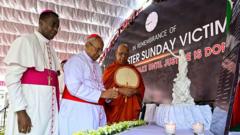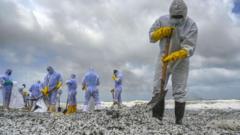Six years after the devastating Easter bombings that claimed 269 lives in Sri Lanka, the Vatican has designated 167 victims as "heroes of faith." Amid ongoing investigations and controversies, the nation's leadership reaffirms commitments to justice and transparency.
Vatican Honors Victims of Sri Lanka Easter Bombings as 'Heroes of Faith'

Vatican Honors Victims of Sri Lanka Easter Bombings as 'Heroes of Faith'
The Vatican commemorates 167 victims of the tragic 2019 Easter bombings in Sri Lanka, recognizing their faith despite ongoing controversies surrounding the attacks.
The Vatican has posthumously honored 167 individuals who lost their lives during the 2019 Easter bombings in Sri Lanka, designating them as "heroes of faith." The announcement was made by Cardinal Malcolm Ranjith during a commemorative event marking the sixth anniversary of the tragic attacks, which specifically targeted Catholic churches and luxury hotels on Easter Sunday, resulting in the deaths of 269 people.
The vulnerabilities exposed by this violence have left indelible scars on the nation, which experienced a long period of relative peace following its civil war that ended in 2009. However, controversy continues to shadow investigations into the bombings. Although Muslim extremists claimed responsibility, families of the victims and the nation's minority Christian community have criticized the government for allegedly delaying justice against those suspected of orchestrating the attacks.
The public outrage intensified when it was revealed that critical intelligence warnings regarding the attacks were largely ignored by security officials and the government at that time. As a response, Sri Lanka's Supreme Court mandated former president Maithripala Sirisena to provide compensation to the victims who were affected by the failures of leadership. In 2021, a trial against 25 suspects, accused of masterminding the attacks, was launched, yet legal experts warn that the extensive list of charges—totaling 23,000—may result in prolonged proceedings.
Repeated assertions by Cardinal Ranjith and the Catholic community suggest that the government may have sought to conceal evidence to protect key figures behind the bombings. The issue experienced a resurgence of media attention following a 2023 Channel 4 investigation that alleged governmental and military collusion in allowing the attacks for political gain. This investigation implied a linked motive: when presidential elections were held shortly after the bombings, Gotabaya Rajapaksa ascended to power on a strong national security platform. He subsequently denied any connection to the allegations raised in the documentary.
Amid this backdrop, Sri Lanka's newly-elected government in 2024 has posited that the bombings may have been a conspiracy initiated by specific groups to gain political authority. As a part of their renewed commitment to justice, they have reopened inquiries into the attacks, with the findings of a presidential inquiry commission now submitted to the central investigative agency.
In a statement commemorating the anniversary, Prime Minister Harini Amarasuriya affirmed the government's dedication to delivering justice, emphasizing the importance of accountability, transparency, and genuine efforts to honor the memory of the victims, while restoring public confidence in leadership.




















